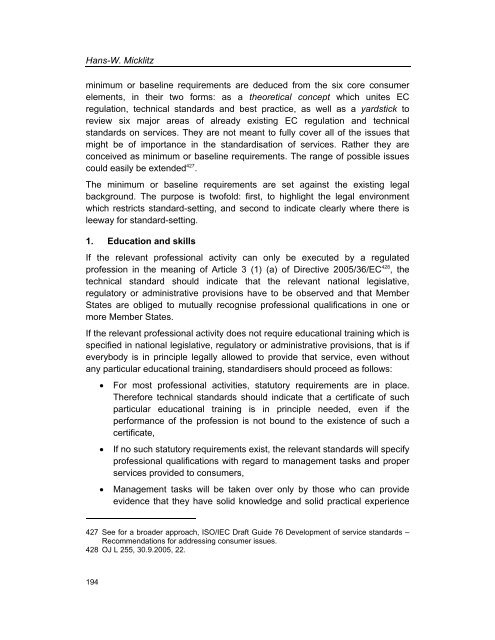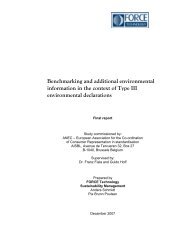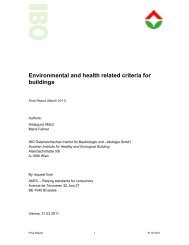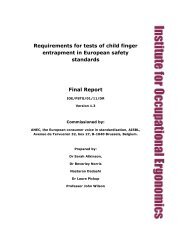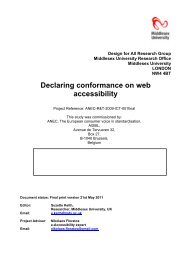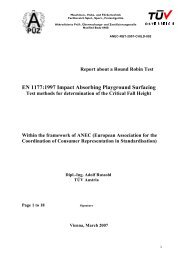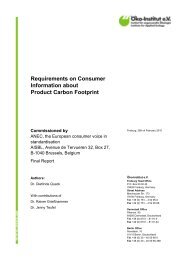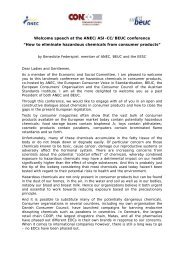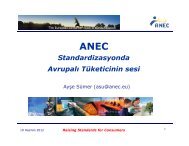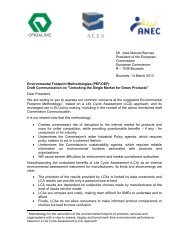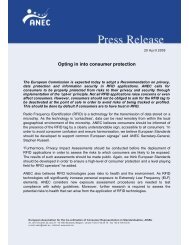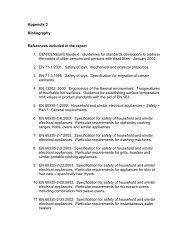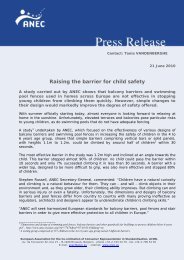Services Standards: Defining the Core Consumer Elements ... - ANEC
Services Standards: Defining the Core Consumer Elements ... - ANEC
Services Standards: Defining the Core Consumer Elements ... - ANEC
You also want an ePaper? Increase the reach of your titles
YUMPU automatically turns print PDFs into web optimized ePapers that Google loves.
Hans-W. Micklitz<br />
minimum or baseline requirements are deduced from <strong>the</strong> six core consumer<br />
elements, in <strong>the</strong>ir two forms: as a <strong>the</strong>oretical concept which unites EC<br />
regulation, technical standards and best practice, as well as a yardstick to<br />
review six major areas of already existing EC regulation and technical<br />
standards on services. They are not meant to fully cover all of <strong>the</strong> issues that<br />
might be of importance in <strong>the</strong> standardisation of services. Ra<strong>the</strong>r <strong>the</strong>y are<br />
conceived as minimum or baseline requirements. The range of possible issues<br />
could easily be extended 427 .<br />
The minimum or baseline requirements are set against <strong>the</strong> existing legal<br />
background. The purpose is twofold: first, to highlight <strong>the</strong> legal environment<br />
which restricts standard-setting, and second to indicate clearly where <strong>the</strong>re is<br />
leeway for standard-setting.<br />
1. Education and skills<br />
If <strong>the</strong> relevant professional activity can only be executed by a regulated<br />
profession in <strong>the</strong> meaning of Article 3 (1) (a) of Directive 2005/36/EC 428 , <strong>the</strong><br />
technical standard should indicate that <strong>the</strong> relevant national legislative,<br />
regulatory or administrative provisions have to be observed and that Member<br />
States are obliged to mutually recognise professional qualifications in one or<br />
more Member States.<br />
If <strong>the</strong> relevant professional activity does not require educational training which is<br />
specified in national legislative, regulatory or administrative provisions, that is if<br />
everybody is in principle legally allowed to provide that service, even without<br />
any particular educational training, standardisers should proceed as follows:<br />
• For most professional activities, statutory requirements are in place.<br />
Therefore technical standards should indicate that a certificate of such<br />
particular educational training is in principle needed, even if <strong>the</strong><br />
performance of <strong>the</strong> profession is not bound to <strong>the</strong> existence of such a<br />
certificate,<br />
• If no such statutory requirements exist, <strong>the</strong> relevant standards will specify<br />
professional qualifications with regard to management tasks and proper<br />
services provided to consumers,<br />
• Management tasks will be taken over only by those who can provide<br />
evidence that <strong>the</strong>y have solid knowledge and solid practical experience<br />
427 See for a broader approach, ISO/IEC Draft Guide 76 Development of service standards –<br />
Recommendations for addressing consumer issues.<br />
428 OJ L 255, 30.9.2005, 22.<br />
194


